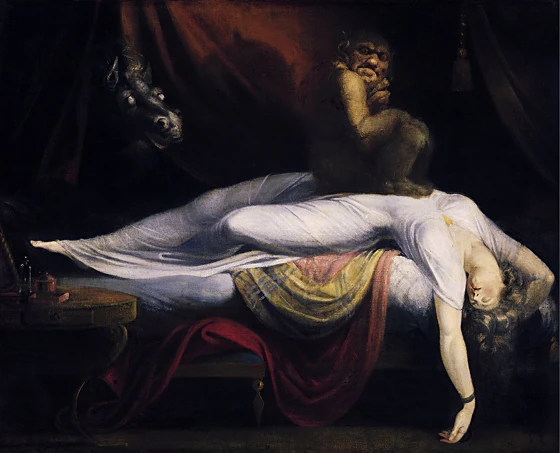
Nihilism inspires holy dread, and thundering (but ineffectual) condemnation. That is understandable, but unrealistic and unhelpful. Meaningness treats nihilism as an ordinary, practical problem we all face, as individuals and societies.
Everyone is a nihilist except us
“Nihilism” is often used as a weapon, or as an insult, for assaulting the Bad Tribes. We hold these Truths sacred because they prove the Cosmic Plan. The Bad Tribes deny them and insist on some meaningless nonsense instead. They don’t really believe in anything!
Christian apologetics often equates atheism with nihilism. Nihilism is mistaken and harmful, so this is a strong emotional argument for Christianity, even if it has no logical validity.1 Loss of Christian faith is a common route into nihilism, giving the argument greater plausibility. However, although most nihilists are atheists, most atheists are not nihilists. On average, they see just as much meaning as religious people, but perceive it as self-produced, as opposed to divinely produced.2

If you hold trees as sacred, you might call anyone who doesn’t a nihilist. I kind of believe trees are sacred, so I’m sympathetic; but it’s more accurate to say just that unbelievers overlook a significant meaning. I might say they are “nihilizing” that particular meaning. Few non-tree-worshippers deny all meanings, so most can’t properly be called nihilists.
Holy dread

For committed eternalists, nihilism is not just mistaken, it is uncanny. It’s not just ethically wrong, it’s taboo.
That’s because eternalism is always wavering. However committed you are, you know it’s wrong. It’s wrong as a stance: meaninglessness is obvious everywhere, and most meaningful things aren’t explained by the Cosmic Plan. Every eternalist system often contradicts what you plainly see.
If everything else is nihilism, however, you’d better reinforce eternalism by reminding yourself of its horror . The threat of the collapse of all meaning justifies any drastic action.
The uncanny is a glimpse of the Shadow—the not-me that you have rejected and hidden from yourself. If you identify with eternalism, you banish from your sight any hint of meaninglessness.
And then, at three a.m., you wake in a cold sweat with the thought “is this all there is?” And nihilism looms in the dark at the foot of the bed, leering at you.
To maintain eternalism, you must treat nihilism not just as a silly mistake (which it is), nor just an amoral threat to society (which it is); not as a possibility that could be considered rationally and rejected: but as a taboo that must not be considered—lest you be seduced by its creepy, forbidden, sexual allure.
Black magic

Most groups and individuals accused of “nihilism” recognize that the word is mainly a weapon used against them, and therefore strongly reject it, and explain how they do believe in something special.
Others seize it as a defiant identity. Embracing the Shadow by violating taboos liberates personal power: energy that was tied up in not-seeing. Nihilism is particularly attractive when “dark triad” aspects of personality manifest: narcissism, Machiavellianism, and psychopathy. Some nihilists use their elite ideology as black magic: as an unholy weapon against eternalists. In their rage, they take sadistic glee in destroying eternalist illusions and throwing former believers into black despair.
Your own eternalism is best dismantled gently and gradually. If you are deeply stuck in it, however, violence may be the only answer. Then nihilistic black magic can also have a positive power of personal transformation. I wrote about this at length in two essay series on Buddhism for Vampires: “We are all monsters” and “Dark culture and tantric transformation.” Particularly relevant are the essays “Black magic, transformation, and power” and “Black magic and meaningness.”
Appropriating nihilism as dark culture
Nihilism may be a valuable, if unpleasant, diversion on the way to the complete stance. The complete stance recognizes what is right in nihilism—the nebulosity of meaningness, and the outright meaninglessness of many phenomena. If a temporary romance with nihilism is the only way to come to appreciate that, violating some taboos may be worth the price.
As the psychological transformation approaches completion, you can appropriate nihilism’s dark power as compassionate communication. It is unkind to destroy the illusions of the vulnerable before they are ready, but encouraging others to escape eternalism can be beneficial.
The alchemical reaction between grisly horror and good humor produces art—dark culture—and play. That is an invitation to join and enjoy the dance of nebulosity and pattern.
- 1.In Buddhism, “eternalist” is often used as a corresponding weapon directed at anyone who believes in something you think obviously isn’t real. Partisans of the Tibetan Geluk sect accuse the Nyingma sect of eternalism for believing in the “luminosity of emptiness,” and nihilism for denying the objective existence of karma. Partisans of the Nyingma sect accuse the Geluk sect of nihilism for insisting on the “non-affirming negation” which denies the luminosity of emptiness, and eternalism for teaching that karma is fixed. Religious wars have been fought over this.
- 2.David Speed, Thomas J. Coleman, III, and Joseph Langston, “What Do You Mean, ‘What Does It All Mean?’ Atheism, Nonreligion, and Life Meaning,” SAGE Open, January 2018.
